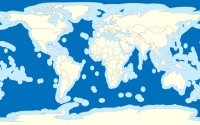China

Quicktabs: Keywords

The United States is telling a defiant China that it must follow an international court ruling that rebuked its illegal actions in the South China Sea but China has been quick to point out the obvious hypocrisy in U.S. non-party status to UNCLOS.
[ More ]
The United States should ratify the United Nations Convention on the Law of Sea (UNCLOS) in the wake of Manila’s victory over Beijing in The Hague-based Permanent Court of Arbitration (PCA) says one senior Democratic lawmaker. The United States—which acts as the guarantor of the liberal-institutional world order—is notably absent from the treaty—much to the chagrin of executive branch officials.
[ More ]
As an international tribunal prepares to rule on Beijing's territorial claims in the South China Sea, officials in Washington, Tokyo and Southeast Asia are on tenterhooks. Yet, in the words of one senior Chinese official, Beijing does not care.
[ More ]
The U.S. military’s effort to keep the Asia-Pacific region stable and secure in the face of a rising China is akin to the 50-year Cold War standoff with the Soviet Union, Defense Secretary Ash Carter said Wednesday. Chinese and U.S. actions and reactions in the South China Sea are just one part of a grand pattern in an era he predicted will end when China changes internally.
[ More ]
Keeping in line with its policy to conduct operations regularly in the South China Sea, the U.S. Navy is preparing to conduct a third freedom of navigation operation (FONOP) in the South China Sea in early April, Reuters reported on Saturday.
[ More ]
Singapore has suggested the expansion of a key naval protocol to defuse tensions in the South China Sea, the country’s new foreign minister said yesterday on the final day of his maiden voyage to China.
[ More ]
On Friday, China passed the country's first law on deep seafloor mining. The law is designed to protect the maritime environment and ensure sustainable exploitation of its mineral resources.
[ More ]
In the wake of Washington’s second “freedom of navigation” operation near Beijing’s man-made islets in the South China Sea, an often overlooked fact remains: The set of laws governing global maritime behavior that the U.S. has been touting has never been ratified by the Senate.
[ More ]
The author argues that it is time for Congress to "put partisan politics aside and focus on national interests" by ratifying UNCLOS which restore U.S. leadership in resolving the South China Seas dispute and "allow the U.S. military complete freedom of action and would not interfere with critical American-led programs like the Proliferation Security Initiative."
[ More ]
U.S. Chief of Naval Operations Admiral John Richardson is prepared to defend U.S. rights to navigate in the South China Seas with an upcoming Freedom of Navigation operations, arguing that no one owns the territory China is claiming.
[ More ]Pages
Finally, the Convention also offers the United States a diplomatic and political solution should a dispute with China arise.167 Although the United States traditionally resists dispute resolution mechanisms, it would be in its interest to embrace them here. As a non-party to the Convention, a potential dispute between China and the United States could escalate into an explosive situation. By ratifying the Convention, the U.S. will have the support of the international community to exert pressure on China—either for peaceful dispute resolution or to adhere to the provisions of the Convention that it too has ratified.168
Militarily, the Convention provides the United States with a key strategic advantage that its armed services rely upon. That advantage is “the ability to navigate freely on, over, and under the world’s oceans.”158 In an urgent situation, the United States would be free to enter the territorial sea of any party to the Convention, including China, without losing momentum by halting to obtain permission, enter into negotiations, or weigh the benefits of violating international law.159 This is increasingly important given the recent skirmish between China and the United States on the seas. In March of 2009, U.S. ships were collecting information in what China claimed was an illegal manner in its exclusive economic zone.160 Chinese and U.S. naval ships had a brief standoff that was peacefully resolved. Because “such incidents can be expected in the future,” U.S. ratification of the Convention is essential.161 If the United States were a party to the Convention, it could argue that it was freely navigating—an activity that is permissible in China’s exclusive economic zones under the Convention.
The U.S.’s post-World War II record of success in shaping a favorable law of the sea agenda was achieved without a serious rival. For decades, developing nations looked to the Soviet Union for leadership in opposing perceived imperialistic trends in U.S. foreign policy. However, within the law of the sea, the Soviet antagonist was notably absent. As the nation most capable of challenging U.S. operations and underlying legal doctrines, the Soviets had no interest in doing so. The U.S. and Soviet Union were, in effect, law of the sea allies.53
Today, China shows far less inclination toward cooperation. Although Chinese legal arguments are not entirely original, what separates China from the traditionally ineffectual opponents of military maritime mobility is China’s ambitious naval modernization.54 The Chinese have served notice they intend to be at least a regional maritime power and perhaps more. Moreover, the Chinese intend to protect their maritime interests by redefining key aspects of the maritime legal regime.55
If indeed the Chinese are inclined to lead a law of the sea insurgency from a position of maritime strength, the international political climate for doing so is more favorable today than 1982, when UNCLOS opened for signature, or even than 1994, when UNCLOS entered into force. Today, states with coastal concerns and interests of their own may find China’s arguments useful in their own contexts. Two especially fertile justifications for increased regulation are protecting the coastal marine environment and ensuring off-shore security.
Regardless of the pace of change, the critical factor in creating and changing international custom will continue to be the relative power of relevant actors.93 The creation of international law is a political process and those with the political, economic, and military power to bend the international legal environment to their own objectives are generally successful in doing so. As relative power changes among international actors, changes to established legal paradigms should be expected.
The implications for the law of the sea are obvious. China’s willingness to challenge traditional legal constructs and ability to influence states with similar interests cannot be dismissed, especially if a dramatic event accelerates the change. One need not agree with China’s arguments or be certain of their ultimate success to acknowledge China’s potential as an advocate for coastal state interests. Whether these interests will reshape the law of the sea remains to be seen. However, to assume that customary law will remain static and that the traditional maritime powers will continue to dictate its future seems retrospective.94
In short, although an INCSEA agreement could, in theory, reduce the possibility of miscalculation during un-alerted sea encounters between U.S. and Chinese naval and air forces, there are many reasons that the United States should not pursue such an arrangement. First, unlike the Soviet Navy, the PLA Navy is not a "blue water" navy with global reach and responsibilities. Elevating the PLA Navy to such a stature would not be in the best interests of the United States. Second, the United States and the Soviet Union shared a common interest in freedom of navigation and access to the world's oceans. U.S. and Chinese interpretations of the law of the sea are diametrically opposed and cannot be reconciled. Third, INCSEA is a navy-to-navy agreement. However, the bulk of PRC harassment and aggressive behavior against U.S. ships is conducted by PRC non-military law enforcement agencies and civilian proxies (e.g., small cargo ships and fishing trawlers). An INCSEA agreement would not apply to these vessels and aircraft. Fourth, INCSEA is a Cold War instrument. Defining the U.S.-China relationship in such terms would be counter-productive for both nations. Fifth, based on its activities in the near seas over the past several decades, China can hardly be characterized as a responsible state actor. Its actions in the South China Sea, in particular, are inconsistent with the spirit and intent of INCSEA and reflect a series of broken promises, intimidation, and aggressive behavior towards its neighbors. Finally, unlike 1972, the International Regulations for Preventing Collisions at Sea (COLREGS) and other international and regional arrangements provide internationally recognized and accepted measures that can be used to prevent incidents at sea." New measures are unnecessary.
In short, the Soviet Navy was a true global blue water navy. Its ships operated around the world with impunity and erased the image that the USSR was solely a continental power. The PLA Navy has not achieved a similar global status. In this regard, INCSEA also gave the Soviet Navy something the Red Army didn't have - a bilateral relationship with its U.S. counterpart. Since the Soviet Union had traditionally been considered a land power, INCSEA elevated the prestige of the Soviet Navy at home and abroad.30 An INCSEA agreement with the PRC would significantly enhance the stature of the PLA Navy by suggesting it was a naval power on par with U.S. and former Soviet Navies. It would also force the U.S. Navy to treat the PLA Navy as an equal, something which it clearly is not. Perhaps more importantly, however, the prestige gained by signing an INCSEA agreement could lead the Chinese government to allocate a larger percentage of the defense budget to the PLA Navy. In 2010, the PLA Navy was already receiving more than one-third of a defense budget that has experienced double-digit growth for the last twenty years.31
It is also important to note that UNCLOS does not treat intelligence collection as a threat or use of force against the sovereignty, territorial integrity or political independence of the coastal state in violation of the U.N. Charter. Article 19(2)(c) clearly distinguishes collecting intelligence from "threat or use of force," which is discussed as a separate prohibited activity in Article 19(2)(a) for ships engaged in innocent passage. This issue was resolved by the Security Council in 1960 following the shoot down of a U.S. U-2 spy plane near Sverdlovsk, Russia. An effort by the Soviet Union to have the Security Council decide that the activity of the U.S. spy plane was an act of aggression was soundly defeated seven to two (with two abstentions), thereby reaffirming the legality of peacetime intelligence collection under the U.N. Charter.47 This view is shared by most experts.4
The Chinese and U.S. governments also disagree about the rights of warships to operate within a nation's Exclusive Economic Zone (EEZ). UNCLOS grants the coastal state the right to establish an EEZ that "shall not extend beyond 200 nautical miles from the baselines from which the breadth of the territorial sea extends."18 Within the EEZ, the Convention allows all States to enjoy the rights of over flight and navigation limited only by their exercise of due regard for the economic rights of the coastal states.19 In their declaration upon ratification, however, the Chinese stated that they enjoyed "sovereign rights and jurisdiction"20 over its EEZ. By omitting any reference to its economic rights within the EEZ, China appears to take a broad view of its rights to control military activity within its EEZ.21 Furthermore the Chinese government also seeks to limit the rights of warships and aircraft to operate within its EEZ by claiming that the mere presence of the military vessel violates the "due regard" elements of the Convention by posing threats to Chinese national security.22
